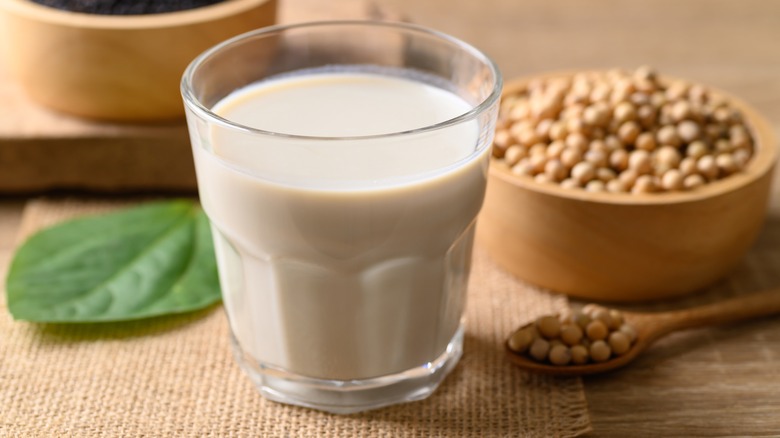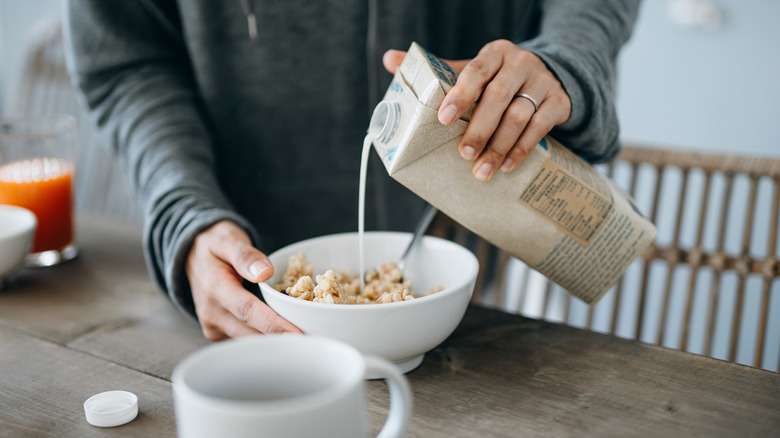The Best Nondairy Milk To Drink For Gut Health
Gone are the days when you visit the supermarket and see only a few dairy options for milk. Nowadays, the milk aisle can stretch for quite a distance and feature a wide variety of dairy and nondairy options. There's a lot more for vegans and those who are lactose-intolerant. You've got your almond, oat, soy, coconut, cashew, rice, and even hemp milk.
With the focus on gut health becoming more popular, perhaps this is what you're looking for in your choice of milk. Gut health is the most important thing when it comes to keeping you healthy overall. While your digestive system is responsible for breaking down and ingesting nutrients from the food you consume, the microbiome in your gut could also be connected to your immune system response, mood and mental health, heart health, sleep, and cancer risk (via Better Health Channel).
According to Dr. Will Bulsiewicz, a South Carolina-based gastroenterologist and the author of "Fiber Fueled: The Plant-Based Gut Health Program for Losing Weight, Restoring Your Health, and Optimizing Your Microbiome," soy milk is your top contender for gut health (via Well+Good). For starters, the benefits are comparable to drinking cow's milk because of soy milk's complete protein profile, which means it has all nine essential amino acids (only a few plant-based milks do). Now let's take a look at why it's good for gut health.
Soy products can positively alter your gut microbiome
Per a 2016 study in the Journal of Agricultural and Food Chemistry, soy foods and components have been linked with altering your gut microbiome in such a way that it lowers your risk of diseases. The researchers note that soy-based foods can "increase the levels of bifidobacteria and lactobacilli and alter the ratio between Firmicutes and Bacteroidetes."
Medical nutritionist and aesthetic physician Dr. Aalika Banerji Shah told NDTV Food that this basically means that there's a beneficial shift that's happening in your gut, where probiotic bacteria are increased and microbial balance is achieved. "These changes in the microbiota then help reduce pathogenic bacteria populations in the gut and assist in reducing the risk of diseases such as immune deficiencies, allergies, obesity, diabetes, cancer, and cardiovascular diseases." The fiber content in the milk (2 grams in one unsweetened cup) helps with healthy digestion and preventing constipation too. Plus, if it's not clear already, soy is great for those with lactose sensitivities because it's naturally lactose-free. It is also a safe nondairy option for those who have irritable bowel syndrome (IBS).
Gut health aside, soy milk is also great for reducing blood pressure levels, preventing heart disease and stroke, and boosting bone health because of its isoflavone content, shared Dr. Will Bulsiewicz (via Well+Good). It's low in saturated fat and has been known to benefit muscle recovery in those who do resistance training too. So where does soy milk get its bad rep from?
Myths and facts about this nondairy option
You can't read about soy milk without also hearing about its supposed association with breast cancer risk because of the isoflavones that act as estrogen in your body, but according to the American Cancer Society, these fears are unfounded, mainly because the studies done so far have been on animals, and humans and rodents digest soy differently.
A 2010 study in the Journal of Nutrition found that soy intake through childhood and adolescence could actually prevent the risk of breast cancer. Research done in 2018 and published in Nutrients had similar results, but with prostate cancer. That being said, if you are concerned about your hormone levels, you should speak with your healthcare provider before adding soy milk to your diet, shared dietitian nutritionist Krutika Nanavati (via Clean Plates). As for soy milk increasing your estrogen levels, this is dependent on the estrogen levels currently in your system, per Harvard T. H. Chan Public School of Health.
If you want to give this plant-based milk a try to improve your gut health, choose the unsweetened, organic (because it's free of chemicals and pesticides), and fortified (because of added nutrients like calcium and vitamin D) kind. Those with soy allergies, thyroid problems, and a history of kidney stones should be careful, however. With thyroid, the concern is with how soy milk affects the absorption of medications, per Mayo Clinic. The oxalate content in the milk could be a concern for those with kidney stone risk.



